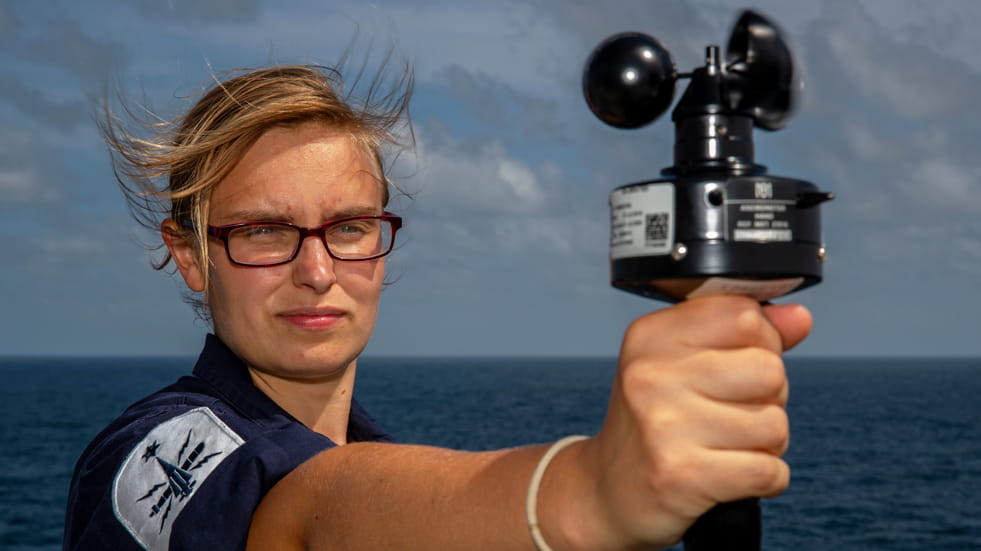Hydrography and Meteorology Specialist
You’ll use advanced equipment to provide information about local tides, currents, sea depth and even the seabed.
- £18,500 - £58,000
- No qualifications
- Surface Fleet
- Warfare
- Rating level
£31,000
Your minimum salary from day one
Zero
£38,500
Your approximate salary after about two years
Free
6 weeks
Travel

My job is all about measuring and recording sea and weather conditions, which means I get to see a lot of the world, and some of the more interesting environments.
Role details
What you’ll do
Helping to plan global missions for Royal Marines Commandos and our state-of-the-art aircraft and warships is a huge responsibility. That’s what you’ll be doing as a Royal Navy Hydrography and Meteorology Specialist: building a detailed picture of environmental conditions so that our missions are operationally effective. It’s a challenging role, and you’ll work in some of the most diverse environments in the world, whether you’re on an Ice Patrol Ship in the Antarctic, or supporting flying operations from one of our new Aircraft Carriers.
Your role
- You’ll get to choose whether you specialise in Hydrography or Meteorology, and from day one you’ll work towards a Foundation Degree, and then a BSc.
- Hydrographers complete ocean and coastal surveys, recording information on currents, water composition and depth.
- Meteorologists measure the environmental impact on operations, determining cloud cover for our aircraft or oceanographic information for our submarines, and ultimately forecasting the weather.
- Both roles use some of the most advanced kit on the planet.
Pay & benefits
- A salary that rises to at least £23,496 after initial training
- Potential earnings rising to over £58,000 as your career progresses
- Get additional pay starting at £4.05 per day if you specialise in Hydrography
- An excellent pension scheme
- Six weeks of paid holiday every year
- Free medical and dental care
Skills for life
Qualifications you'll gain
- Attain a Level 3 Data Technician Apprenticeship
- GCSEs, A-Levels and the option to complete a BSc
- Specialist vocational qualifications, with a significant financial contribution from us
Skills you'll develop
- The ability to collect, process and analyse complex data, while understanding how to use it to our advantage
- How to use advanced survey equipment and environmental sensors
Eligibility
- You must be aged 16 to 39
- No qualifications are required for this role
- A National of the United Kingdom, a Commonwealth citizen or Dual National. Dual Nationality restrictions do apply
- A Body Mass Index (BMI) between 18 and 28 (between 17 and 27 if under 18)
Skills & Interests
- Analytical thinking and good communication skills
- Interest in cutting-edge technology
- A passion for working in new and unique environments
- Team player
- An adventurous spirit
Joining Process
From picking your role to starting on your first day, these are the steps you'll take to join as a rating.
Submit an application
Defence Aptitude Assessment (DAA)
You’ll be tested on: Verbal Reasoning, Numerical Reasoning, Work Rate, Spatial Reasoning, Electrical Comprehension and Mechanical Comprehension.
To prepare, you can practise the DAA
Interview
Candidate Preparation Course (CPC)
This four-day induction to life in the Royal Navy, including a Swimming Test and a fitness assessment, is a pass or fail course
Start training
Once you’ve passed a Security Check, you’ll be offered a place at HMS Raleigh
Career Progression
Become Leading Hand, join a ship or shore establishment
Become Petty Officer, lead a team, take increased responsibility
Got a question?
Our virtual recruiter is available to answer your questions 24 hours a day
